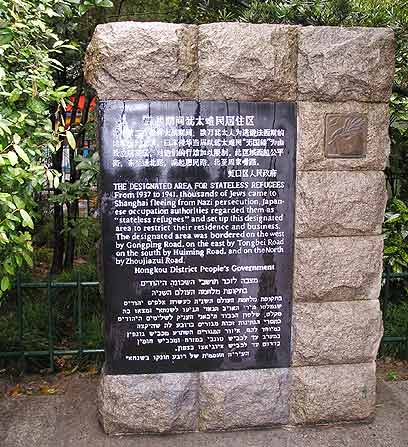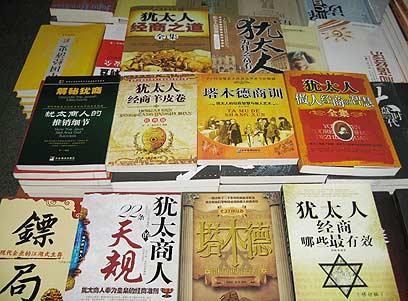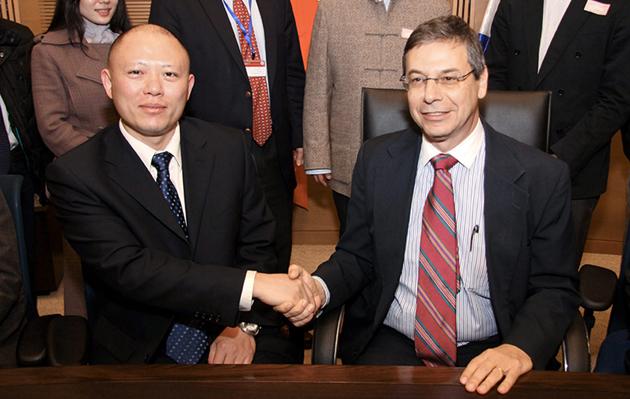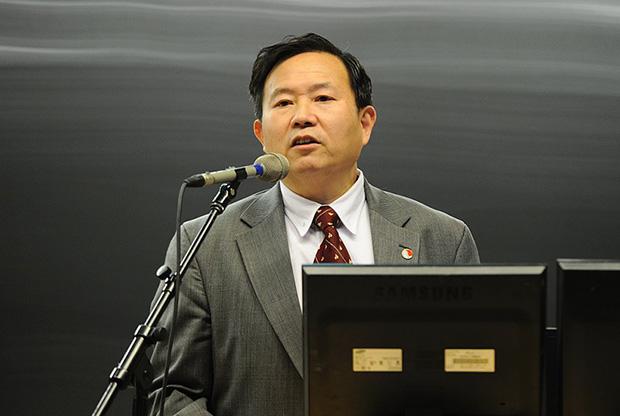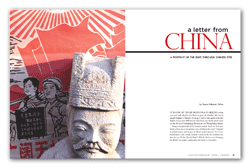
A Letter from China
A Portrait of the Jews Through Chinese
Eyes
By Susan Fishman Orlins
It is one of those mornings in
Beijing when you can’t tell whether it’s likely to
pour or whether the sun is simply behind a blanket of smog.
I stuff a rain jacket into the basket of my new $40 bicycle
and, from my hotel, pedal west to the 10-level Wangfujing
Bookstore on Wangfujing Street.
Along a cramped aisle of the business
section, heads are bent over books whose cover art includes
stars of David, the word “Talmud” in gilded letters and
moment/images of Moses embracing the Ten Commandments. I ask
a small, fortyish woman if she can translate one title for
me. It’s the “Jewish People’s Bible for Business and
Managing the World,” she replies, adding that the book
is a bestseller.
I pick up a book whose cover reads, in
Chinese and English, The Wisdom of Judaic Trader,
and flip through the pages, which are illustrated with
big-nosed caricatures. Other tomes that people around me are
reading offer morals via spiritual fables; some barely
mention religion. In many, the content is simply fabricated,
highlighting, for instance, the success of financier J.P.
Morgan (who was Episcopalian, not Jewish). I walk upstairs
to peruse the broad selection of child-rearing books and
notice a Chinese man, a little boy by his side, engrossed in
The Jewish Way of Raising Children. I ask why this
title interests him. “Because the Jewish people are very
clever,” he answers.
In this land of 1.4 billion, the
widespread perception of Jews as masters of commerce (and
much more) has given rise to an entire genre of Jewish
how-to literature. While few Chinese can articulate quite
what a Jew is, many believe that if they could emulate,
among other things, how Jewish parents raise their
children—as though there were a prescription—it would boost
their offspring’s chances of growing up to own a bank or win
Nobel Prizes. Here’s how one thread goes: Einstein was
Jewish, Einstein was smart; therefore, Jews are smart.
These powerful impressions of Jewish
accomplishments are common in the most developed regions of
China, all of which are in the midst of an economic
explosion; more skyscrapers will have been built across
China this year than exist in all of Manhattan. But amid the
bamboo scaffolding and the accompanying materialism and
corruption, people have also begun to search for moral
guidance—which some associate with the Jewish mystique—as
they sprint down the path to prosperity.
Outside the bookstore I
stroll through the old neighborhood where I lived for a year
in 1980. Past the vendors hawking roasted corncobs on sticks
and steaming sweet potatoes is the hospital where I picked
up my adopted daughter more than 20 years ago. Back then my
Chinese friends never mentioned Jews; school texts made
scant, if any, reference to Jewish history.
Then, as now, the only Chinese who called
themselves Jewish—numbering in the hundreds—were the
descendants of Persians who traveled the Silk Road a
millennium ago. They had arrived with camels, bearing
cottons to trade for silks, and many never left. Several
thousand settled in Kaifeng, the capital of the Song Dynasty
that hummed with teahouses and restaurants. Today the
Kaifeng Jews know little about Judaism and look
indistinguishable from their neighbors, though some—without
understanding exactly why—follow dietary laws that resemble
kashrut.
As for the Jewish expatriates I knew in
Beijing in 1980, there were barely enough of us to form a
minyan. On Yom Kippur, we gathered for makeshift services in
our suite overlooking the glazed tile rooftops of the
Forbidden City. Now, however, there are many Jewish
expatriate communities in China, and some educated Chinese
are even studying Hebrew, a practice which began in 1985,
when Beijing University first offered a Hebrew language
major. Simon Yu, a member of that class of eight, wanted to
learn more than the little available in high school history
books. “Friends thought it was strange that I was studying
Hebrew,” he acknowledges, “but now people think it’s very
charming and special.”
Simon Yu, an associate professor at the
Shanghai Academy of Social Sciences’ Center for Jewish
Studies, can speak Hebrew, but he cannot attend Jewish
services. Independent religion does not exist in China; even
the five sanctioned religions—Buddhism, Islam,
Protestantism, Roman Catholicism and Taoism—are controlled
by the government. (The Vatican, for example, does not fully
recognize Catholicism in China because, for one thing, China
refuses to cede authority over selecting bishops.) It is
hard to conceive of Judaism joining the ranks of
government-approved religions, considering, for instance,
that the government authorities do not allow Chinese
citizens to attend religious services led by outsiders.
One night at a Shabbat dinner at the home
of Rabbi Avraham Greenberg, his pregnant wife Nechama and
their two toddlers, I ask the bearded 26-year-old Israeli
rabbi whether Chinese ever show up at his services. “When I
arrived, my brother was already a rabbi here,” he says.
“After a local Chinese attended his service, the authorities
approached my brother, telling him to pack up and leave. But
he calmed them down by promising to turn away any such
‘visitors’ in the future. After that, a few tried, but my
brother asked them to leave.”
After five days in Beijing,
I board an overnight train bound for Shanghai. In my
sleeping compartment, I open River Town, Peter
Hessler’s memoir about teaching in China from 1996 to 1998.
I reach a passage in which Hessler is also on a train,
engrossed in a book. A woman approaches and comments on how
diligently he is working. “She peered at me,” he writes,
“and it was clear that she was thinking hard about
something. ‘Are you Jewish?’ she finally asked. ‘No,’ I
said, and something in her expression made me want to
apologize…. I sensed her disappointment as she returned to
her berth.”
How, then, to reconcile this reverence
for Jews with the appreciation for Adolf Hitler that Hessler
mentions elsewhere in his book? Hessler writes that
alongside “a deep respect for the Jewish people,” Chinese
appreciate the icon of Hitler mainly because of Charlie
Chaplain’s portrayal in The Great Dictator, which
many have seen multiple times. How are they able to overlook
that small matter of the Holocaust? For one thing, until
recently, it simply hadn’t been taught. For another, the
politically controlled Chinese educational system valued
rote learning and discouraged much independent thought. It
similarly trained Chinese to revere the revolutionary
Chinese leader Mao Zedong: At least a dozen educated Chinese
I ask for their view of Mao, give an identical answer, that
Mao was “70 percent good and 30 percent bad.” Even though
Mao had a major hand in substantially more deaths than
Hitler in the excesses of the Great Leap Forward and the
Cultural Revolution, this has been the Communist Party line
since 1981.
But this is changing: Fewer Chinese are
ignorant of the dark fate of many Jews of the last century.
In Shanghai, the port city to which many Jewish refugees
fled the Nazis, I meet Yang Peiming, an avid historian and
the proprietor of the Propaganda Poster Art Centre. He shows
me his private collection of 70-year-old passports that he
acquired at a local flea market. Each is stamped with
swastikas and a large red “J,” indicating it had belonged to
a European Jew who had made it to Shanghai, one of the few
shores open to these refugees. “Shanghai’s history cannot be
complete without Jewish history,” he tells me. “We learn
from Jewish people.”
Fudan Fuzhong, the
school where my daughter Emily teaches English conversation,
consists of low-rise dormitory and classroom buildings on a
lush campus. Today I am teaching a Jewish culture lesson to
five of Emily’s 12 weekly classes. The seeming identicalness
of these groups startles me: each a six-by-eight matrix of
10th-graders with shiny black hair, all wearing navy warm-up
suits trimmed in orange. Teachers rather than students are
the ones to move, so in every classroom 48 girls and
boys—some of China’s most promising—remain in the same tight
rows from 7:50 a.m. until 3:55 p.m. with breaks only for
physical education and lunch. Twice a day they do eye
exercises in their seats, five minutes of impassively
massaging around the eyes with fingertips per instructions
from a sing-song voice on the public address system. In the
evenings they return to their rows from 6:30 until 9:00 for
enforced study hall.
Emily had alerted me to the students’
reluctance to speak in class so, 15 minutes into the
40-minute session, I hand out paper and ask three questions
that I hope will spark discussion: What are your impressions
of Jewish people? Where did you get those impressions? What
questions do you have for us?
Throughout the week, I repeat this
lesson, which yields 576 responses. Around 90 percent of the
students write that Jews are clever, and approximately half
of those add that Jewish people are good at business. Though
the consensus is that Jews are rich, some who have seen the
Holocaust movie The Pianist say that Jews are poor.
A couple of perceptions of Jews as bullies come from
government-controlled TV news, during which reporters often
portray Palestinians as victims and refer to Israelis as
Jews, as though the two are interchangeable.
Some students question how Jewish people
feel about Germans today. A few want to know how you can
tell whether someone is Jewish. Several ask how they can get
“rich like the Jews,” including a boy who writes, “Jews own
50 percent of the wealth in America. How do they do this?”
There are numerous comments along the lines of: “Jews are
friendly, because Emily and Susan are friendly.”
The four-hour train ride to
Nanjing, a blur of browns and greens, is a welcome
contrast to Shanghai’s city skyline reconfigured daily by
lofty, dangling cranes. I had emailed the founder of Nanjing
University’s Institute for Jewish Studies, Xu Xin
(pronounced Shoo Shin), and asked what motivates Chinese
students to pursue Jewish studies. He invited me to visit,
suggesting a Friday so I could attend his undergraduate
Jewish culture class as well as meet his graduate students.
Xu Xin greets me in the hotel lobby. At approximately five
feet five inches, he walks with a light step in brown
leather Docksiders that seem more Nantucket than Nanjing.
“As a scholar of American literature, I
became interested in Jewish writers after Saul Bellow won
the Nobel Prize,” he explains in fluent English. In 1976, Xu
began researching Jewish American history and culture,
translating works of Norman Mailer, Clifford Odets and
others into Chinese and publishing articles such as “Jewish
Humor” and “The Image of the Schlemiel in Jewish
Literature,” in which he likens the schlemiel to the wise
fool in Chinese literature.
“In 1985 an American named James Friend
arrived here to teach literature for six months,” he
explains as we enter the 105-year-old university’s campus.
“I had never known a Jew before.” The two professors formed
a bond, and Friend invited Xu to live with his family and
teach at Chicago State University, where Friend was chairman
of the English department. While in the United States Xu
attended a bar mitzvah, seders and even Jewish funerals,
including that of Professor Friend, whose untimely death
from a heart attack occurred toward the end of Xu’s stay.
“My time with the Friends provided me
with a great opportunity to look at Jewish people,” says Xu.
He was impressed that Jews follow laws, rather than an
individual or just a set of beliefs. “Their way of living
and thinking made me aware that Jewish culture has many
lessons Chinese people could learn on their way to becoming
a responsible part of the international society.”
To that end, with one room and a few books, he created a
Jewish studies center at Nanjing University in 1992, shortly
after China and Israel established diplomatic relations.
Xu—who at age 18 was sent to the countryside during the
Cultural Revolution—was a pioneer; today at least ten other
academic institutions offer Judaic studies.
Xu leads the way into a tall, new
building and into an elevator which opens only a few steps
from a brass wall plaque that says Institute for Jewish
Studies in Chinese, English and Hebrew. “Each year we add
two M.A. and two Ph.D. students. And we try to provide a
scholarship for our Ph.D. candidates to study in Israel,”
explains Xu, motioning for me to follow him into the
library. The students want to understand, he says, how
Jewish culture has survived, indeed flourished, often in the
face of adversity. With a sweep of his arm, Xu shows off
more than 10,000 titles that range from Encyclopedia of
Midrash to Jewish Wit for all Occasions. The
stacks also hold volumes Xu has written or translated,
including an abridged version of the Encyclopedia
Judaica.
Down a spotless hallway is a conference
room where glass cabinets display assorted Judaica—a Kiddush
cup, a tallit, a small Torah—evoking the quiet ambience of
an upscale temple gift shop. Professor Song Lihong and six
of the program’s 12 graduate students are waiting for us.
After easing into a chair at the head of the long,
rectangular table, Xu leans forward and folds his hands in
front of him. “Once Western studies became part of the
curriculum in Chinese universities,” he says, “in
literature, philosophy, science—inevitably you came across a
Jewish name.” He notes the disproportionate number of Jewish
Nobel Prize recipients and adds, “You don’t see that many
Norwegians with Nobel Prizes.”
Xu seems to delight in the shared aspects
of our two cultures, saying, “Both have had a great impact
in the world, both have suffered and in both cases, parents
do anything they could to give their children better
education. Jewish and Chinese are the only major cultures to
retain their traditions unbroken for thousands of years.”
We board a crowded bus
that takes us across the Yangtze River to a satellite campus
for Xu’s freshman Jewish Culture class. He tells me that I
will be the first Jew most of the undergraduates have ever
met.
In the spacious classroom, Xu introduces
me and hands me the microphone and the 100 students applaud
vigorously. They then become utterly silent, riveted before
I say a word. In English, I tell them about my semi-secular
style of Judaism, a slice of life unlikely to show up in
their textbooks. They seem to follow, smiling appropriately
when I mention my teenage struggle with my father, who
forbade me to date a non-Jewish football player from my
school. Their attention is so focused that I wonder if they
are scrutinizing me to figure out what distinguishes my
Jewishness. Forty-five minutes later, I invite them to ask
questions.
A slender girl wearing glasses and a
ponytail approaches and says, “The biggest difference
between Chinese and Jewish culture is that you believe in
religion.” I ask about Confucius, and she answers, “He was
an educator, not in your heart.” Another adds, “For us,
spirituality does not exist.”
Later on, at a nearby restaurant. I sit
beside Professor Song, a.k.a. Akiba, at the round table
where Moshe, Yam, Gal, Omer and Alon, the graduate students
I met earlier, have already gathered. Just as the Chinese
infatuation with the West has led many to take English
names, these students have assumed Hebrew names.
The bespectacled Akiba, uses his
chopsticks to place a mound of spicy pork with vegetables on
my plate. “We don’t have Judeophobia, we have Judeophilia,”
he says with a smile. It was the Roman historian and
warrior, Flavius Josephus, who inspired his interest in
Jewish studies. “There were many renegade Chinese; Josephus
was the first renegade Jew I discovered,” he explains.
The students join in, explaining the
origins of their fascination. One student tells me that she
“became interested because of a special year, 135 A.D., when
most of the people left Palestine and began diaspora. In
spite of anti-Semitism, the Jewish people survived and kept
their traditions.” Another is interested in the parallels
between the Holocaust and the Nanjing massacre, during which
Japanese troops killed as many as 300,000 Chinese, including
thousands of women and children. Akiba adds, “The Japanese
still have not pled guilty to this crime. In Germany the
president knelt at Auschwitz; this is a sharp contrast.”
As I survey the table, it’s evident how
comfortable these students are in sharing their passion for
Judaism. And though each has a different focus, I am struck
that I am witnessing such a deep appreciation of Jewish
culture.
I think of a remark Xu made earlier that
although he is proud of the similarities that Chinese
culture shares with Jewish culture, he believes Jews have
exceeded the Chinese in one valuable quality: Morality. He
cited the pirated DVDs sold openly on China’s streets as an
example of shamelessness that he finds all too prevalent in
his country. I suggested that Xu’s conception of Jews might
be a tad idealistic, since I imagined that I myself would
willingly buy such DVDs—though I admitted I would feel
guilty. “When you buy, you feel guilty,” Xu told me. “You
have this moral sense; when Chinese buy it, they never feel
guilty. That’s the moral challenge.” He grew solemn and,
with the conviction of a rabbi, added, “We could learn to
achieve a moral society from Jewish people.”
The day winds down and we emerge into the
humid air. The aroma of fresh fruit wafts from the back of a
faded green pickup truck where students have lined up to buy
whole neatly peeled pineapples for around 30 cents apiece.
Back at the main campus, I walk with Xu to his bicycle along
a tree-lined path. It is the end of the workweek, and a
teacher heading the other way nods and says, “Ni hao.
Shabbat shalom.”
|






























